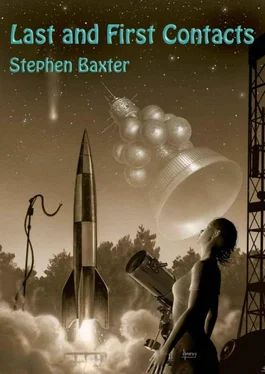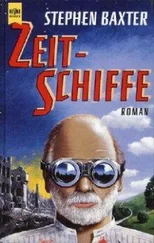Stephen Baxter - Last and First Contacts
Здесь есть возможность читать онлайн «Stephen Baxter - Last and First Contacts» весь текст электронной книги совершенно бесплатно (целиком полную версию без сокращений). В некоторых случаях можно слушать аудио, скачать через торрент в формате fb2 и присутствует краткое содержание. Город: London, Год выпуска: 2012, ISBN: 2012, Издательство: NewCon Press, Жанр: Фантастика и фэнтези, на английском языке. Описание произведения, (предисловие) а так же отзывы посетителей доступны на портале библиотеки ЛибКат.
- Название:Last and First Contacts
- Автор:
- Издательство:NewCon Press
- Жанр:
- Год:2012
- Город:London
- ISBN:978-1-907069-40-6
- Рейтинг книги:5 / 5. Голосов: 1
-
Избранное:Добавить в избранное
- Отзывы:
-
Ваша оценка:
- 100
- 1
- 2
- 3
- 4
- 5
Last and First Contacts: краткое содержание, описание и аннотация
Предлагаем к чтению аннотацию, описание, краткое содержание или предисловие (зависит от того, что написал сам автор книги «Last and First Contacts»). Если вы не нашли необходимую информацию о книге — напишите в комментариях, мы постараемся отыскать её.
Last and First Contacts
Last and First Contacts — читать онлайн бесплатно полную книгу (весь текст) целиком
Ниже представлен текст книги, разбитый по страницам. Система сохранения места последней прочитанной страницы, позволяет с удобством читать онлайн бесплатно книгу «Last and First Contacts», без необходимости каждый раз заново искать на чём Вы остановились. Поставьте закладку, и сможете в любой момент перейти на страницу, на которой закончили чтение.
Интервал:
Закладка:
As for me, I intend to take the Spit. She hasn’t been flown since Day 1, and is as good as new as far as I can tell. I might try for one of those slime-covered rocks in the sea.
Or I might try for something I’ve glimpsed on the horizon, under the greenish sky. Lights . A city? Not human, surely, but who knows what lies waiting for us on the other side of the Fold in the World?
What else must I say before I go?
I hope we won’t be the last to come this way. I hope that the next to do so come, unlike us, in peace.
Mummy, keep feeding my cats for me, and I’m sorry about the lack of grandchildren. Bea will have to make up the numbers (sorry, sis!).
Enough, before I start splashing these pages with salt water. This is Bliss Stirling, girl reporter for the BBC, over and out!
[Editor’s note: There the transcript ends. Found lodged in a space between bulkheads, it remains the only written record of the Goering ’s journey to have survived on board the hulk. No filmed or tape-recorded material has been salvaged. The journal is published with respect to the memory of Miss Stirling. However as Miss Stirling was contracted by the BBC and the Royal Geographic Society specifically to cover the Goering ’s Pacific expedition, all these materials must be regarded as COPYRIGHT the British Broadcasting Conglomerate MCMLII. Signed PETER CARINHALL, Board of Governors, BBC.]
No More Stories
‘It’s strange to find myself in this position. Dying, I mean. I’ve always found it hard to believe that things will just go on afterwards. After me . That the sun will come up, the milkman will call. Will it all just fold up and go away when I’ve gone?’
These were the first words his mother said to Simon, when he got out of the car.
She stood in her doorway, old-lady stocky, solid, arms folded, over eighty years old. Her wrinkles were runnels in papery flesh that ran down to a small, frowning mouth. She peered around the close, as if suspicious.
Simon collected his small suitcase from the back of the car. It had a luggage tag from a New York flight, a reminder that he was fifty years old, and that he did have a life beyond his mother’s, working for a biotech company in London, selling gen-enged goldfish as children’s pets. Now that he was back in this Sheffield suburb where he’d grown up, his London life seemed remote, a dream.
He locked the car and walked up to his mother. She presented her cheek for him to kiss. It was cold, rough-textured.
‘I had a good journey,’ he said, for he knew she wouldn’t ask.
‘I am dying, you know,’ she said, as if to make sure he understood.
‘Oh, Mother.’ He put an arm around her shoulders. She was hard, like a lump of gristle and bone, and didn’t soften into the hug. She had cancer. They had never actually used that word between them.
She stepped back to let him into the house. The hall was spotless, obsessively cleaned and ordered, yet it smelled stale. A palm frond folded into a cross hung on the wall, a reminder that Easter was coming, a relic of intricate Catholic rituals he’d abandoned when he left home. He put his suitcase down.
‘Don’t put it there,’ his mother said.
A familiar claustrophobia closed in around him. ‘All right.’ He grabbed the case and climbed the stairs, fourteen of them as he used to count in his childhood. But now there was an old-lady safety banister fixed to the wall.
She had made up one of the twin beds in the room he had once shared with his brother. There wasn’t a trace of his childhood left in here, none of his toys or books or school photos.
He came downstairs. ‘Mother, I’m gasping. Can I make a cup of tea?’
‘The pot’s still fresh. I’ll fetch a cup and saucer.’ She bustled off to the kitchen.
He walked into the lounge.
The only change he could see since his last visit was a fancy new standard lamp with a downturned cowl, to shed light on the lap of an old lady sitting in the best armchair, facing the telly, peering at her sewing with fading eyes. The old carriage clock, a legacy from a long-dead great uncle, still sat in its place on the concrete 1970s fireplace. The clock was flanked by a clutter of photos, as usual. Most of them were fading colour prints of grandchildren. Simon had no grandchildren to offer, and so was unrepresented here. But the photos had been pushed back to make room for a new image in a gold frame. Brownish, blurred and faded, it was a portrait of a smiling young man in a straw boater. He had a long, strong face. Simon recognised the photo, taken from a musty old album and evidently blown up. It was his grandfather, Mother’s Dad, who had died when Simon was five or six.
Just for a moment the light seemed odd to him. Cold, yellow-purple. And there was something strange beyond the window. Pillow-like shapes, gleaming in a watery sun. He saw all this from the corner of his eye. But when he turned to look directly, the light from the picture window turned spring green, shining from the small back garden, with its lawn and roses and the last of the azalea blossom. Maybe his eyes were tired from the drive, playing tricks.
‘It’s just for comfort. The photo.’
The male voice made Simon turn clumsily, almost tripping.
A man sat on the sofa, almost hidden behind the door, with a cup of tea on an occasional table. ‘Sorry. You didn’t see me. Didn’t mean to make you jump.’ He stood and shook Simon’s hand. ‘I’m Gabriel Nolan.’ His voice had a soft Irish burr. Maybe sixty, he was short, round, bald as an egg. He wore a pale jacket, black shirt, and dog collar. He had biscuit crumbs down his front.
Simon guessed, ‘Father Nolan?’
‘From Saint Michael’s. The latest incumbent.’
The last parish priest Simon remembered had been the very old, very frail man who had confirmed him, aged thirteen.
Mother came in, walking stiffly, cradling a cup and saucer. ‘Sit down, Simon, you’re blocking the light.’
Simon sat in the room’s other armchair, with his back to the window. Mother poured out some tea with milk, and added sugar, though he hadn’t taken sugar for three decades.
‘Simon was just admiring the portrait of your father, Eileen.’
‘Well, I don’t have many pictures of Dad. You didn’t take many in those days. That’s the best one, I think.’
‘We find comfort in familiar things, in the past.’
‘I always felt safe when Dad was there,’ Mother said. ‘In the war, you know.’
But, Simon thought, Granddad was long dead. She’d led a whole life since then, the life that included Simon’s own childhood. Mother always had been self-centred. Any crisis in her children’s lives, like Mary’s recurrent illness as a child, or the illegitimate kid Peter had fathered as a student, somehow always turned into a drama about her. Now somehow she was back in the past with her own father in her own childhood, and there was no room for Simon.
Mother said, ‘There might not be anybody left who remembers Dad, but me. Do you think we get deader, when there’s nobody left who remembers us?’
‘We live on in the eyes of Christ.’
Simon said, ‘Father Nolan, don’t you think Mother should talk to the doctor again? She won’t listen to me.’
‘Oh, don’t be ridiculous, Simon,’ Mother said.
‘Best to accept,’ said Father Nolan. ‘If your mother has. Best not to question.’
They both stared back at him, seamless, united. Fifty years old he felt awkward, a child who didn’t know what to say to the grown-ups.
He stood up, putting down his tea cup. ‘I’ve some shirts that could do with hanging.’
Mother sniffed. ‘There might be a bit of space. Later there’s my papers to do.’
Читать дальшеИнтервал:
Закладка:
Похожие книги на «Last and First Contacts»
Представляем Вашему вниманию похожие книги на «Last and First Contacts» списком для выбора. Мы отобрали схожую по названию и смыслу литературу в надежде предоставить читателям больше вариантов отыскать новые, интересные, ещё непрочитанные произведения.
Обсуждение, отзывы о книге «Last and First Contacts» и просто собственные мнения читателей. Оставьте ваши комментарии, напишите, что Вы думаете о произведении, его смысле или главных героях. Укажите что конкретно понравилось, а что нет, и почему Вы так считаете.












